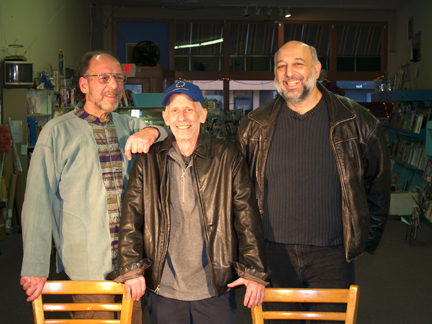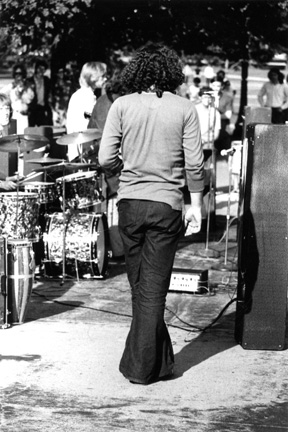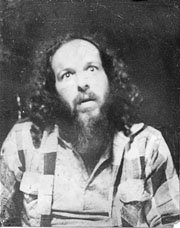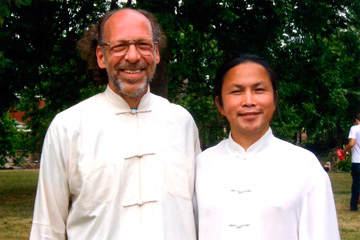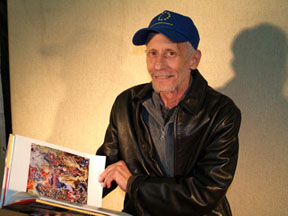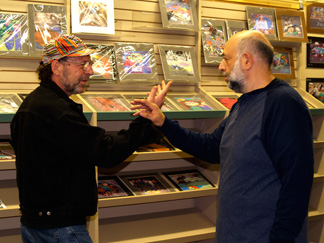
Columbus, Ohio USA
Return to homepage www.shortnorth.com
Monkeys Retreat: Then and Now
A hippies-era boutique turns holistic healing center
by Jennifer Hambrick
jmhambrick@yahoo.com
December 2007
Columbus' own three monkeys - Darryl Mendelson, Stan Bobrof, and Ro-z Mendelson
PHOTO/ Rick BorgiaSee no evil, hear no evil, speak no evil: thus say the three monkeys of Japanese legend.
For the last three decades, Columbus’ own three monkeys, Darryl Mendelson, Ro-z Mendelson and Stan Bobrof, have co-owned and operated Monkeys Retreat, one of the city’s most protean small businesses. The monkeys came of age during the radical days of the 1960s living lives very much in tune with their times. Though their several business ventures in Columbus and New York have changed with the times to accommodate the trends of their customers, the monkeys have always managed to stay true to their interests – hippie culture, alternative literature, Eastern philosophies and health practices.
Now they’ve come full circle, reinventing their retreat as a center devoted to teaching Eastern movement and healing arts and selling related books and supplies. After more than three decades in the business of marketing their interests to the tastes of their customers, the monkeys are once again retooling their retreat.California, Guitars, School Buses
Before there was Monkeys Retreat, there were its many precursors.In the summer of 1968, long hair and bell-bottoms were the look. Psychedelia was the great hope for transcending ordinary reality. Some said the Age of Aquarius was dawning. Darryl Mendelson, a Brooklyn-born transplant to Columbus had just graduated from Ohio State University with a degree in psychology. He knew he didn’t want to continue on that track but wasn’t quite sure what else to do. Like many others at loose ends then, he went to San Francisco.
Out west, Mendelson headed straight for Haight-Ashbury, the hub of hippiedom, where he started selling underground newspapers.
“Mostly what I saw in San Francisco were people from Columbus, hundreds of people from Columbus,” he said. “The few people that had already moved out there at the time, they were letting 20, 30 people crash at their houses.”
These were heady times, the air filled with the not-so-pent-up energy of angry youth protesting war, capitalism, the status quo. Near the end of the summer, Darryl hitchhiked from San Francisco down to Los Angeles to live in Venice Beach and experience the alternative lifestyle there. Meanwhile, the counterculture movement, thriving in the Bay Area, had also taken root thousands of miles away in Columbus. Eventually, Mendelson woke up from his California dream, realized how much he missed the friends he had left behind in his adopted town and, as the summer sun set on the Pacific, moved back to Columbus.
Blurring the line between the counterculture and the “capitalist pigs,” Mendelson got an idea to open a store and communications center selling hippie clothes, literature and other accessories. One night at Larry’s Bar across from the OSU campus, he met Canton/Columbus native Stan Bobrof, who also wanted to start a business supplying the counterculture with its stock in trade – arts and crafts supplies, underground communications, head shop paraphernalia. He had another partner in his good friend Allen Ross, and they were already looking at a storefront.
“We met and just started talking, and we just became partners right away, barely knowing each other,” Mendelson said.
Within two months, Mendelson, Bobrof, and Ross opened Charlie’s Guitar at E. 13th and High streets. The store might well have been just the next in short-lived campus-area fad shops. Instead, it outlasted many of its neighbors and was even an anchor for what became the Pearl Alley commercial strip.
“Every once in a while somebody had opened a little stall, but we had the first really successful business, and we ended up bringing a lot of friends who opened stores. We turned that whole strip into the commercial strip it is now,” Mendelson said.
With Charlie’s Guitar, Mendelson and Bobrof found themselves at the right place at the right time – cornering the Columbus market for the hottest counterculture trends. After the store’s used clothing sales took off, with pea coats and fur coats the hottest items, Mendelson and Bobrof added new fashions and underground newspapers and comix to their inventory. Bobrof claims Charlie’s Guitar was the first store in Columbus to sell bell-bottoms. Business was booming.
“Charlie’s Guitar, it had it all,” Mendelson said. “Eventually, besides bell-bottoms and pea coats, we had the first real boutique that really had a lot of outrageous clothing for men – flowers and bright colors.”
For the year and a half that Charlie’s Guitar was in existence, it expanded from boutique and communication center to include a branch “campus” in a couple of rooms right above the store. There Mendelson and Bobrof offered Free University courses on subjects ranging from ways to expand one’s consciousness to the I Ching, subjects they had encountered in college Eastern philosophy courses. The store and the rooms above it also became a pied-à-terre for free spirits and spiritual seekers. Mendelson recalls a Hare Krishna follower, pillow in tow, spending nights in one of the rooms above Charlie’s Guitar. The customers – who were so numerous at the store’s heyday as to require a police officer to route them through the store – came to Charlie’s Guitar seeking all that the universe had to offer through the pages of alternative publications and the teachings of the East.
Darryl Mendelson on the OSU Campus, 1969. “It was just sort of part of the whole openness of the counterculture of the time,” Mendelson said. “There was also all of this new information that people wanted. A lot of people are experiencing whole new things – getting into Eastern religions, taking drugs – and we had books about everything. And you couldn’t find a lot of those books and publications in regular stores.”
Darryl Mendelson There seemed to be an insatiable appetite in Columbus for counterculture accoutrements, and Mendelson and Bobrof thought they had it made. In 1969, they left Charlie’s Guitar in the care of employees and went to the first Woodstock Festival. Ken Kesey and the Merry Pranksters and Wavy Gravy’s Hog Farm, both communes from the west coast, camped on school buses at the fringes of the festival. The following year, Bobrof bought three school buses, and he and Darryl Mendelson and Darryl’s brother, Jeff (“Ro-z”), lived on them with others they knew from Columbus, traveling around the eastern United States in a sort of moving commune from one music festival to another. When they returned to Columbus, Bobrof and the Mendelson brothers realized that the employees charged to manage Charlie’s Guitar had not done well. The store would never be the same again.
“We were doing incredible business, actually. It sort of screwed me up, because I was young and I thought that business was that easy. That’s why we got rid of the store and we were just on the school buses, and we thought, hey, if this doesn’t work, we just start all over again,” Darryl Mendelson said. “And when we started all over again, it wasn’t that easy.”Moonshine, Fourth Street, Monkeys
Luckily, when Charlie’s Guitar closed its doors forever in 1970, the Mendelsons and Bobrof had something to fall back on.
Before leaving for San Francisco in early summer 1968, Darryl Mendelson had staged one of Columbus’ first outdoor music festivals, a be-in on the OSU oval. In 1972, Stan, Ro-z and Darryl opened Positively Fourth Street as a place to stage local music. It was one of Columbus’ first community bars. “It was the Stache’s of the time,” Bobrof said.
Positively Fourth Street closed in 1974 after an incident involving the police took place at the bar. In trouble, the trio asked for help. They got it from the Community Union, an umbrella organization that included the Open Door Clinic and the Columbus Free Press. The result was the Moonshine Co-op, a bar owned and run cooperatively by the community.
Around the same time, the Mendelsons and Bobrof began studying tai chi chuan with Dr. Fred Wu, a Chinese-born teacher of traditional Chinese philosophies, martial arts and health practices. In the fall of 1973, the three monkeys started taking tai chi and kung fu classes from Dr. Wu, who was teaching at the Wesley Foundation at the time. The classes were in an open room across the hall from the Columbus Food co-op, a favorite spot for the entrepreneurs. Dr. Wu taught them how to put the Eastern philosophies they had studied for years into physical practice.
“When we were working with Dr Wu, we found out that a lot of this philosophy and stuff had important practical applications,” Darryl Mendelson said.
After a while, group ownership of the Moonshine Co-op started to disintegrate.
“The (other) people didn’t want to put their name on it,” Darryl Mendelson said. “We always put our name on what we’re doing, so if people have complaints, they talk to us. There was really nobody in charge, and after a while there were problems.”
Eventually all of the responsibility for the Moonshine Co-op came back to the Mendelsons and Bobrof and, like Phoenix rising again from the ashes, they took control of the business again and renamed it Absolutely Positvely Fourth Street. Until the bar’s demise in 1977, strains of gospel, bluegrass and heavy rock and roll could be heard almost nightly. Even a classical string quartet once performed there.
“During that time, you couldn’t name a style of music that wasn’t played there,” Bobrof said. “Every kind of music was played there. The only stipulation was that it had to be quality.”
Darryl Mendelson with Master Zhongxian Wu at Comfest 2007. The Mendelson brothers studied Shamanic Tiger Qigong with Master Wu. While Bobrof and his friends were booking musical acts at Absolutely Positively Fourth Street, they opened another business to showcase Dr. Wu’s tai chi and kung fu classes. They named the new business Monkeys Retreat, an artful styling of the graceful, backwards moving “repulse monkey” move in tai chi. The name also playfully identifies the store’s owners.
“There were three of us, so (we were) the three monkeys,” Bobrof said.
The monkeys also returned to their past as boutique owners, opening some of the floor space of their new storefront at 2400 N. High St. for stalls from which artisans could sell handicrafts. Monkeys Retreat became half tai chi studio, half arts and crafts bazaar. Eventually it boasted an herbalist, a leather worker, jewelry maker Bonnie Mosley and a wooden pipe maker, Tim West.
West, who now owns both Tim West Pipes and J.H. Lowe & Co., one of the country’s largest pipe making and repair supply companies, got his start in the 10-by-10-square-foot booth he rented at Monkeys Retreat from 1975 to 1980. West had made wooden pipes as a hobby since 1967 and met the Mendelsons and Bobrof while playing in a band that performed regularly at Positively Fourth Street. They needed artisans to rent floor space. West, whose band was breaking up around the time Monkeys Retreat opened, needed work. It was a perfect match. The monkeys had found artisan tenants who were as happy about their unusual career choices as they were serious about balancing their books.“These were ‘60s hippies – and so was I, for that matter – that were going legitimate,” West said. “We were running our own businesses. We were self-employed. We were all very young, but as irresponsible as that business might have looked, we were all very responsible. We all paid our rent and did what we promised to do and ran our businesses as we should. It was definitely an alternative lifestyle, instead of going out and getting a job and having somebody pay your way.”
As artisans moved in and business picked up, the monkeys began selling Chinese herbs and books on tai chi and Chinese martial arts. They then expanded their book section to include science fiction and fantasy titles, and eventually comics, which had been one of their childhood interests. The unusual spelling of Ro-z Mendelson’s nickname was inspired by the Superman comic books. On the day Jeff Mendelson arrived in Columbus, he was wearing a T-shirt with the word “Rosy” printed on it. The name stuck, and a few years later Mendelson himself hyphenated it in emulation of Superman, whose Kryptonian name was Kal-El, and Superman’s father, Jor-El.
“From there I said, Why don’t I just call myself Ro-z, and put R-o-dash-z,” he said.
And in a further nod to comic book surreality, Darryl Mendelson’s name isn’t really Darryl. Since being introduced randomly as Darryl at a party one night long ago, Mendelson, whose real name is Stephen, has been known only by his nickname.
SohoZat opened in Manhattan's SoHo District in 1977. Owners Stan Bobrof and Darryl Mendelson were forced to close the store in 1992 when the rent hit $6000. The comics – and underground comix – inventory at Monkeys Retreat was influenced in no small part by Bobrof and Darryl Mendelson’s store, SohoZat, which opened in 1977 in Manhattan’s then authentically bohemian SoHo district. While in New York for a boutique merchandise show, Bobrof and Mendelson found some retail space on the cheap and decided to start another business.
SohoZat specialized in reading material, especially underground and foreign newspapers and mainstream comics and underground comix.The store’s location in the heart of New York’s artists’ district made it a go-to place for an up-and-coming artistic elite. Neil Martinson, co-producer of San Francisco’s Mission Creek Music Festival and publisher of the online magazine PROOF worked (underage) at SohoZat in the late 1970s and recalls rubbing shoulders there with the likes of the now legendary John Belushi and Pulitzer Prize-winning graphic novelist Art Spiegelman. Martinson also remembers the day Spiegelman hand-delivered the first issue of his radical graphics magazine Raw to SohoZat, which became the first place to sell it.
The comics and alternative-literature inventory at Monkeys Retreat was influenced in no small part by Stan Bobrof (above) and Darryl Mendelson's store, SohoZat, in Manhattan “It was a magical experience to find this store, because it was kind of a dream store for me,” Martinson said. “You walk in and right away there’s the biggest offering of international and domestic and local magazines and newspapers that was available in the city. And to be in an environment where I was constantly meeting cool people. My friends would work in their mom’s office or they’d work in a deli, but this was like a cultural hub. From the late ’70s to the early ’80s SohoZat was probably the hippest store in the history of the world. Everybody went there.
When SohoZat’s rent hit $6,000 in 1992, Bobrof and Darryl Mendelson had to close up shop. Both moved back to Columbus and poured their energies into Monkeys Retreat.
The bazaar managed to retain some balance of tai chi and retail space throughout its first two decades, before the owners moved the store to 1190 N. High in 1996. But gradually artisans started moving out of their stalls. The monkeys found themselves devoting more of their floor space to comix and other literature. No longer an artisans bazaar, Monkeys Retreat became more like SohoZat, a place where you could find newspapers and comix no one else had. All of that started changing as distribution networks became more accessible to retailers, and the Internet made everything available to anyone, anywhere.
The New Monkeys Retreat
In their current location at 1202 N. High St., the monkeys say they have more square footage than the retail book and magazine part of their business supports. People don’t read as much today as they once did, Darryl says, and the Internet has drawn customers away from brick-and-mortar shops. The monkeys have removed most of their central retail displays to create studio space to accommodate more classes in Chinese martial arts and healing practices. Darryl Mendelson considers the new Monkeys Retreat a Taoist boutique, and envisions the store’s retail aspect selling formulas of Chinese herbs and roots and supplies for and literature about Chinese health and healing practices.
“Our specialty, our real talents, are tai chi and healthful healing, and that’s something we really want to expand,” Ro-z Mendelson said.
In addition to classes in Lee’s modified yang-style tai chi chuan, which Monkeys Retreat has offered for the last 31 years, the store now offers a weekly class in shamanic tiger qigong, a form of chi kung (qigong) that the monkeys say is more accessible to the time-conscious American mindset.
“The thing with the tai chi is that you’ve got to be dedicated,” Ro-z Mendelson said. “For me to just teach the outline of a form takes eight, nine months of at least once a week. But the tiger, in an hour and a half, two hours, you can see what the whole things is, so you can get an idea.”
Darryl (L) and Ro-z perform the Tai Chi exercise Push Hands. The monkeys also plan to bring in guest clinicians and speakers to give workshops on traditional health practices. They hope someday to hold a holistic health festival where people could attend workshops given by practitioners of various energetic and dietary systems.
They also are considering reconfiguring some of their retail floor space into an art gallery. Calling on his SohoZat days, Bobrof hopes to re-engage with the visual arts scene in and beyond Columbus to create a gallery in the north end of the Short North that could rival its many trendy south-end counterparts. The monkeys have discussed exhibitions of political artwork and artwork relating to Eastern spirituality.
For more than 35 years the monkeys have been reinventing their enterprises. They admit that they did recently discuss packing it in for good. But those discussions opened new horizons, new ways they could continue to pursue the things that have always interested them. Their own “new” ideas have brought them full circle.
“For a brief moment we thought about closing the store, which led to us remetamorphosing it and really only bringing it back to where we were,” Ro-z Mendelson said. “It’s a balancing act. Sometimes you have to put more effort into one thing while the other things simmer. So that’s actually why I think we’ve been able to do it, because we haven’t been stuck on one thing. It hasn’t been 35 years one thing, it’s been 35 years of ebb and flow and change. That’s what I think makes it enjoyable. We’re always surprised by what comes next.”The monkeys can be reached at 614-294-9511. Visit their Web site at www.monkeysretreat.com
2007-2019 © Short North Gazette, Columbus, Ohio. All rights reserved
Return to homepage www.shortnorth.com
